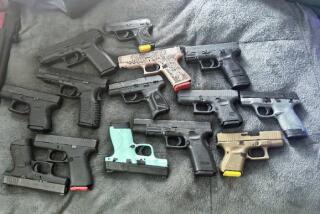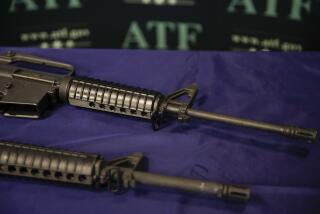O.C. Police Take Heat for Selling Seized Guns : Law enforcement: Departments that engage in the practice face conflicting economic and public pressures.
- Share via
As guns-for-goods programs make headlines nationwide with promises to pull weapons off city streets, some Orange County police departments continue to quietly sell guns confiscated during arrests to private arms dealers.
Huntington Beach and Orange are among those cities that sell seized guns for profit.
“In these economic times, we’re kind of in a philosophical hard spot,” said Orange Police Lt. Timm Browne. “We need the money--it comes back to the general fund--so we’re selling weapons to legitimate, federally licensed gun dealers. We’re not selling to the public, although I’m sure that is where they ultimately end up.”
But at a time when a local hockey team is giving away tickets to get guns off the street, some cities, and even the federal government, are rethinking the sale of seized weapons.
On Tuesday, Santa Ana officials vowed to halt the sales and destroy all confiscated weapons--as soon as their current contract with a Modesto-based auction house expires in July. Costa Mesa stopped selling seized guns last month. Huntington Beach officials will discuss the issue next week.
“We will simply have all our confiscated guns destroyed in the future,” said Santa Ana City Manager David N. Ream. “It’s been an item of discussion amongst the council for quite some time. They just don’t have an interest in being in the gun sale business.”
Santa Ana’s decision to halt the sales--which netted nearly $50,000 last year--came partly in response to persistent complaints from community activist John Raya.
Raya called it a step in the right direction.
“It’s my desire to see this as a state mandate to all law enforcement agencies,” he said. “We sell these weapons that are cheap secondhand guns, and they end up at pawnshops and places like that. An officer has already endangered his life once to take that gun off the street.”
Santa Ana Councilman Ted R. Moreno agreed.
“It’s ridiculous. We should not be out there selling guns that we’ve confiscated back to the gun dealers,” Moreno said. “For $50,000 a year--is that worth a life? A gun that we confiscated and sold might one day kill my wife.”
While Santa Ana Police Chief Paul M. Walters said he respects his city’s decision to stop selling the weapons, he cautioned that the decision will do little, if anything, to stem the crime problem, adding that he is comfortable with the practice of selling certain confiscated guns to dealers.
“There’s not a limit on the number of firearms that can be made or sold. It’s not like you’re adding to the supply” by selling confiscated weapons, Walters said.
“The weapons that we’re concerned about are these high-velocity, assault-type weapons that were supposedly banned years ago, but because of loopholes people are still supplying them. We’re not turning those types of guns over to be sold. No way.”
Many Orange County police departments either destroy all confiscated weapons or contract with the Orange County Sheriff’s Department to do so.
Those police departments include Garden Grove, Tustin, Irvine, Newport Beach, Westminster and Anaheim. Last Saturday, Anaheim police pulled in 104 guns in a one-day guns-for-goods trade-off that got participants a pair of tickets to a Mighty Ducks hockey game.
At least two Orange County cities--Huntington Beach and Orange--still contract with Modesto-based Roger Ernst & Associates to auction confiscated weapons, although all illegal and defective weapons are slated for destruction, police department officials said.
Huntington Beach officials will consider at a Tuesday staff meeting whether to destroy all guns taken from crime scenes, Huntington Beach Police Lt. Chuck Poe said.
“With the big push of having people trade in their guns, it doesn’t make any sense for us to sell them and put them back on the streets,” Poe said.
In 1992, his department sold 48 weapons, collecting $3,281. The next year, police sold 65 weapons, for a $5,186 boost to the city’s general fund. Figures for 1994 were not available.
Santa Ana began selling confiscated weapons in the mid-1980s, said Santa Ana Police Lt. Robert Helton, and from 1991 to 1993, the sale of 1,868 weapons contributed $147,839 to city coffers.
Orange raised $15,919 in 1992 and 1993 from the sale of 286 weapons, Browne said.
Orange police participated in the recent Aamco guns-for-goods program, and seven weapons were turned in and destroyed in exchange for Aamco services, Browne said.
Critics said departments that promote guns-for-goods exchanges while selling confiscated weapons are talking out of both sides of their mouth.
“In my view, it’s hypocritical,” said Hubert Williams, president of the nonprofit, Washington-based Police Foundation, which does research and consulting work for law enforcement agencies.
“We clearly have a proliferation of guns in this society, and anything the police departments can do to take these guns off the street they should do,” he said. “All the real police obligations to the protection of life are blinked at when we become a part of the chain that puts these weapons back on the street.”
If some lawmakers have their way, Santa Ana’s recent choice would become a matter of law.
A bill authored by state Assemblyman Mike Gotch (D-San Diego) and now on the Senate floor would ban all law enforcement agencies in the state from selling confiscated guns.
“It’s indefensible to flood the streets with cheap guns already used in the commission of a crime,” said Gotch, who conceded that his is an uphill battle. He counts only 18 committed votes of the 21 he needs to get the bill through the Senate.
His views, however, are shared by some top federal appointees, including the head of the General Services Administration.
In January, GSA Administrator Roger W. Johnson--the CEO of Irvine’s Western Digital Corp. before his appointment by President Clinton last July--declared that federal law enforcement agencies would no longer be able to sell weapons to gun dealers.
Since 1981, agencies including the FBI, the U.S. Customs Service and the Bureau of Alcohol, Tobacco and Firearms have sold about 65,000 weapons to dealers with GSA permission, GSA spokesman Hap Connors said.
The figures came to Johnson’s attention in October, and he did not like what he saw.
“He started asking (Atty. Gen. Janet) Reno and other Administration officials what was going on. It just went against the grain of common sense, given what’s going on in society,” Connors said.
The gun lobby disagrees.
“Very rarely does a criminal go to a dealer to buy a gun. They either steal them or they go to an out-of-state dealer,” said Gerald Upholt, manager of legislative affairs for the Fullerton-based California Rifle and Pistol Assn. “The contention that (these sales) would have an impact on crime is just ridiculous.”
“The issue of law enforcement selling the guns really ought to be a non-issue,” he added. “It does raise money for local government. The guns are only sold to licensed dealers, and people have to go through the 15-day waiting period in California.”
*
The heat to bring the practice to a stop has been so intense, however, that even the man who makes part of his living buying the confiscated guns says he has had enough.
Roger Ernst, whose Modesto-based auction house has contracted with many California police departments seeking to sell confiscated weapons, said he decided in December that he has had it.
“We are out of the firearms market. It’s all over,” he said. “I don’t want the heat, and I don’t want the phone calls. It’s too political. I’m not going to do it anymore.”
Ernst said he auctions only to licensed gun dealers and will honor his current contracts. He said his company, Roger Ernst & Associates, generated $10 million for law enforcement agencies over the past seven years.
“They can use that money! Everything we did was legal, and it was right and it was proper, and we were dealing with law enforcement agencies,” he said, chiding critics for implying that weapons he auctioned could end up in the hands of criminals.
Ernst & Associates contracts with 720 cities statewide to auction property seized in drug raids, he said.
Times staff writers E.J. Gong Jr. and Thuan Le contributed to this report.
Confiscated Weapons
Some Orange County police departments destroy the guns they seize from suspects. Those departments include Garden Grove, Tustin, Irvine, Newport Beach, Westminster and Anaheim. Other agencies sell confiscated weapons to private dealers, destroying only those that are illegal or defective. Here’s a sample of what some of those sales have netted in the past two years:
1992:
Destroyed Sold Revenue Huntington Beach N/A 48 $3,281 Orange 46 70 4,170 Santa Ana 185 592 46,155 Costa Mesa N/A N/A N/A
*
1993:
Destroyed Sold Revenue Huntington Beach N/A 65 $5,186 Orange 92 216 11,749 Santa Ana 232 621 47,415 Costa Mesa N/A 94 9,862
N/A: Information not available
Source: Individual police departments
Researched by E.J. GONG JR. and THUAN LE / Los Angeles Times
More to Read
Sign up for Essential California
The most important California stories and recommendations in your inbox every morning.
You may occasionally receive promotional content from the Los Angeles Times.










